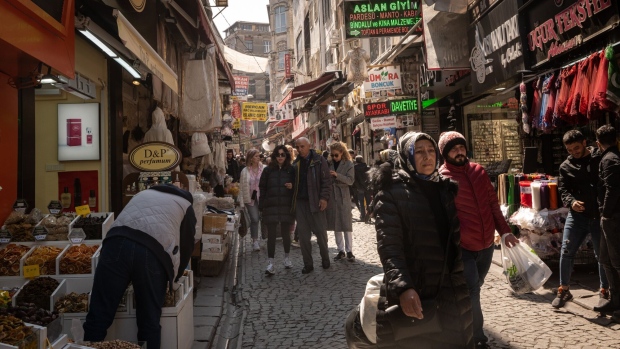Apr 3, 2024
Turkey Inflation Likely Neared 70% in March Ahead of Elections
, Bloomberg News

(Bloomberg) -- Turkish inflation probably surged to almost 70% in March, as the lira weakened on concerns Sunday’s local elections could have prompted a currency rout.
Analysts expect data due on Wednesday to show prices accelerated to 69% on an annual basis last month, up from 67.1% in February, according to a survey conducted by Bloomberg. Monthly inflation — the main gauge that policymakers use — likely slowed to 3.5% from 4.5%, according to a separate poll, still higher than in the preceding quarter.
Turkish nationals increased their holdings of hard currency on concerns the lira would face a sharp depreciation after the March 31 municipal vote, which resulted in an unprecedented defeat for President Recep Tayyip Erdogan. After last May’s presidential elections, the lira dropped as much as 7% in a single day and the worry was a repeat of a similar slump.
The Turkish currency was the worst performer across emerging market currencies last month, with a loss of 3.2% against the US dollar.
Turkey is prone to policy swings after elections. However, Erdogan has this time ruled out concerns of a step back from orthodox measures and reiterated support for his economic team despite his defeat. That most likely signals a continuation of higher borrowing costs and tighter fiscal policies to tame inflation.
Central Bank Governor Fatih Karahan told the Banks Association on Monday that tight policy would be maintained, while the lira surged against the dollar. The likes of Goldman Sachs Group Inc. and Deutsche Bank AG expect the currency’s performance to improve.
Read more: Turkish Markets Swept Up in Relief Rally as Election Risk Passes
What Bloomberg Economics Says...
“Price gains will likely pick up their pace ahead, reaching a peak of 73% in May. A drawn-out deceleration process will follow, taking inflation to 43% by year-end, partly due to favorable base effects.
Inflation risks are tilted to the upside, mainly on potential revisions to the government’s tax and fee schedule following the March 31 local vote, a faster lira depreciation or an escalation in the Middle East war.”
— Selva Bahar Baziki, economist. Click here to read more.
Amid worse-than-expected February inflation and a lira vulnerable to a selloff, the Turkish central bank surprised markets with a 500bps interest-rate raise last month, lifting the benchmark to 50%, the highest in decades. In its most recent policy minutes, the central bank drew attention to elevated rent inflation, sticky services and food prices, combined with a steep minimum wage hike at the start of the year.
“Fiscal policy is set to play a crucial role in addressing inflationary pressures and fostering economic rebalancing,” said Deutsche Bank analysts Yigit Onay and Christian Wietoska.
“Potential adjustments in administered prices, such as those for electricity and natural gas tariffs for households, fiscal consolidation endeavors, and income policies, will significantly influence the inflation path,” they said, expecting year-end inflation to hover around 45%.
The central bank expects inflation to finish the year at 36%.
--With assistance from Joel Rinneby.
©2024 Bloomberg L.P.








